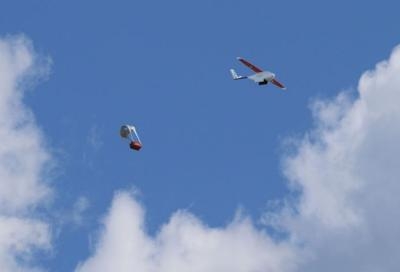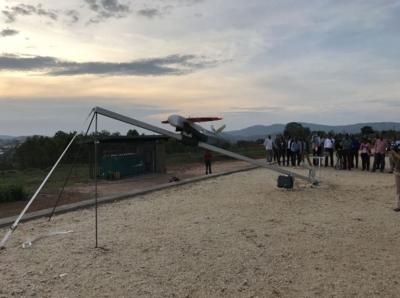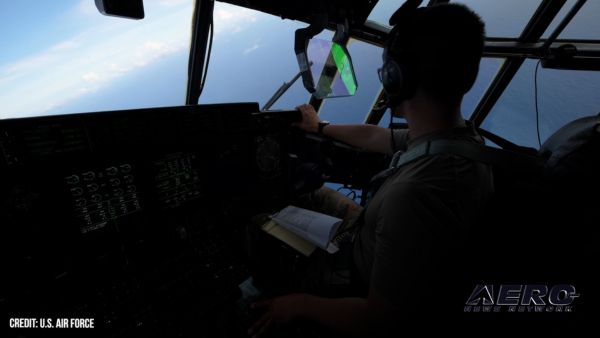Can Provide Up To 150 Emergency Medical Drone Flights A Day
Rwandan President Paul Kagame recently launched the world’s first national drone delivery service during a ceremony in the country’s centrally located Muhanga District. The Rwandan government will begin using drones to make up to 150 on-demand, emergency deliveries per day of life-saving blood to 21 transfusing facilities located in the western half of the country.

The drones and delivery service are built and operated by Zipline, a California-based robotics company. While Rwanda’s drone delivery service will initially focus on blood, an international partnership between UPS, Gavi, the Vaccine Alliance, and Zipline will help the country quickly expand the types of medicines and lifesaving vaccines that can be delivered.
"Drones are very useful, both commercially and for improving services in the health sector. We are happy to be launching this innovative technology and to continue working with partners to develop it further,” said Rwandan President Paul Kagame.
Throughout the developing world, access to lifesaving and critical health products is hampered by what is known as the last-mile problem: the inability to deliver needed medicine from a city to rural or remote locations due to lack of adequate transportation, communication and supply chain infrastructure. In Rwanda, postpartum hemorrhaging is the leading cause of death for pregnant women. Blood requires storage and transport at safe temperatures and spoils quickly. Because there are many different blood products and no way to accurately project future needs, many transfusion clinics do not keep all the blood they may need in stock.
During Rwanda’s lengthy rainy season, many roads wash out becoming impassible or non-existent. The result is that all too often someone in need of a lifesaving transfusion cannot access the blood they need to survive.

Rwanda’s national drone delivery program enables blood transfusion clinics across the Western half of the country to place emergency orders by cell phone text message. The orders are then received by Zipline at its at its distribution center located in the country’s Muhanga region where the company maintains a fleet of 15 drones, called Zips. Each Zip can fly up to 150 km (approx. 81 nautical miles) round trip—even in wind and rain—and carry 1.5kg (approx. 3.3 pounds) of blood, which is enough to save a person's life. Zips take off and land at the Nest, and make deliveries by descending close to the ground and air dropping medicine to a designated spot called a “mailbox” near the health centers they serve. Zipline will make 50-150 emergency flights a day to 21 transfusion clinics across the Western Half of Rwanda and can fulfill orders in around 30 minutes.
Rwanda plans to expand Zipline’s drone delivery service to the Eastern half of the country in early 2017, putting almost every one of the country’s 11 million citizens within reach of instant delivery of lifesaving medicines. “The inability to deliver life saving medicines to the people who need them the most causes millions of preventable deaths each year around the world. Zipline will help solve that problem once and for all,” said Zipline CEO Keller Rinaudo. “We’ve built an instant delivery system for the world, allowing medicine to be delivered on-demand and at low-cost, anywhere.”
The commercial partnership between Rwanda and Zipline is expected to save thousands of lives over the next three years. Through this effort, Rwanda is leading the world by using cutting-edge technology to leapfrog the absence of road infrastructure and to provide cutting edge healthcare access to all its 11 million citizens. The work in Rwanda is being further supported by an international partnership between Zipline, UPS and Gavi, the Vaccine Alliance. Thanks to a $1.1 million grant from the UPS Foundation, the partnership will study Rwanda’s blood drone delivery operation with an eye towards helping the country quickly expanding the types of medicines and lifesaving vaccines that can be delivered.
(Images provided with UPS news release)
 ANN FAQ: Submit a News Story!
ANN FAQ: Submit a News Story! Aero-News: Quote of the Day (06.12.24)
Aero-News: Quote of the Day (06.12.24) ANN's Daily Aero-Linx (06.12.24)
ANN's Daily Aero-Linx (06.12.24) ANN's Daily Aero-Term (06.12.24): Adcock Range
ANN's Daily Aero-Term (06.12.24): Adcock Range Airborne Affordable Flyers 06.06.24: 200th ALTO, Rotax SB, Risen 916iSV
Airborne Affordable Flyers 06.06.24: 200th ALTO, Rotax SB, Risen 916iSV




